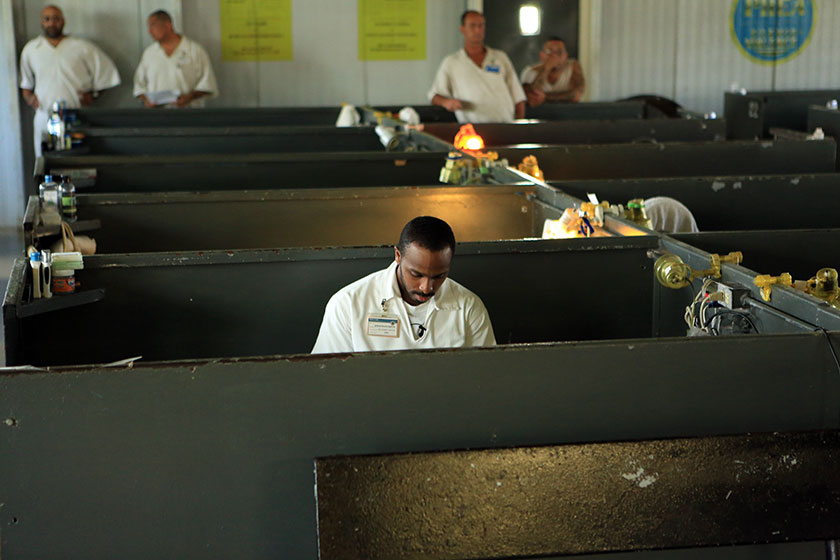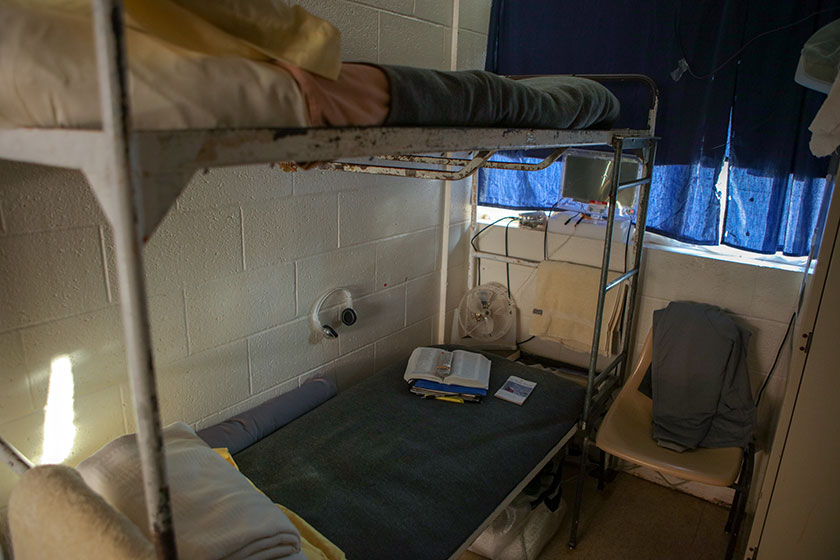Prisons and jails are loud.
The following resource was adapted from the 2019 Summer Edition of Inside Journal®, a quarterly newspaper printed and distributed by Prison Fellowship® to correctional facilities across the country.
Written specifically for incarcerated men and women, each issue (offered in a men's edition, a women's edition, and a Spanish-language edition) explains the Gospel in a fresh way, offers encouragement and motivation, and shares practical advice for the daily struggles of prison life. Distributed to prisoners via chaplains, program coordinators, and in-prison volunteers, Inside Journal provides a unique way to share the hope of Jesus with those who may never attend a chapel service or Bible study.
Click here to see the original article: Men's Edition | Women's Edition | Spanish Edition

7 TIPS FOR BETTER SLEEP BEHIND BARS
"Don't go to jail if you want a good night's sleep," jokes Chad, a former Louisiana prisoner. There's no doubt about it: Prison can keep you from catching many z's.
Inside Journal asked former and current prisoners about their sleeping experiences. The majority had trouble sleeping, especially their first weeks, thanks to uncomfortable mattresses, a snoring cellie [cellmate], the noise of officers' keys, banging doors, screaming or loud talking, anxiety, safety concerns, and flushing toilets.
Getting less than six to eight hours of sleep can negatively affect your body, mind, and spirit. Sleep deprivation is also downright dangerous. According to the National Sleep Foundation, extremely sleepy people are 70 percent more likely to have a workplace accident.
Studies show long-term sleep loss can cause weight gain, memory problems, a lowered immune system, high blood pressure, and an increased risk for diabetes, depression, irritability, and more. To know if you're getting enough sleep, ask yourself, are you:
- Waking up not feeling refreshed most days?
- Feeling sleepy most days?
- Struggling to concentrate and stay alert during work or activities?
- Feeling depressed or on edge?
If so, here are some tips for better sleep, as shared by prisoners and psychologists:
1) MAKE YOUR SLEEPING AREA AS COMFORTABLE AS POSSIBLE
Buy earplugs, a small fan, or a radio with headphones and use them to block out external noises. Also, make sure your body isn't too warm or cold.
Get creative with your blankets and pillows. "My mattress is not conducive to a good night's sleep, but I fold up a blanket [to put under] my hips," says Steve, a current prisoner, about his flat, hard bed.

2) BE KIND TO YOUR BODY AND MIND
Avoid anything unhealthy or negative before bed, including junk foods and violent TV shows.
According to many sleep experts, including Dr. Michael Breus, you should avoid caffeine after 2 p.m. and stop eating or exercising several hours before bedtime.
Many prisoners agreed, adding it's also important to exercise and eat right daily.
Joseph, another current prisoner, says he buys melatonin (an over-the-counter sleep aid) at the commissary to help him.
- Zane, prisoner
3) PRAY AND READ SCRIPTURE
Prayer has helped many prisoners to get better sleep, like Zane, who says, "Surrender things beyond your control to God or a higher power."
After struggling with awful sleep, night terrors, and cold sweats, Zane dug into prayer and Scripture. Eventually, he was free of his sleep issues for good.
Michelle, a former prisoner in New York, had a similar experience. "I slept better because I began the process of forgiving myself and started attending chapel," she says.
"Evening devotionals also help," adds Joseph.
4) WRITE OUT YOUR WORRIES
Several prisoners we spoke with found journaling to be an effective way of getting thoughts out of their heads for better rest.
"My anxieties, if allowed to go unchecked, will keep me up at night," explains Marvin. "An unsolved problem will float through my brain until I write it down," adds Jesse about his incarceration worries.
5) FIND YOUR 'HAPPY PLACE'
James Peasley, a Minnesota therapist, explains that if negative thoughts or worries are running through your mind, you can change your thoughts just like you would change the channel if something bad came on television.
To change your thoughts, he suggests finding your own personal "mental safe place," somewhere you’ve been that has really positive memories, ideally somewhere in nature. Close your eyes and vividly visualize the sights, sounds, smells, and sensations of that place until you feel calm.
"This can actually cause you to get control over troubling emotions," Peasley says.
"It doesn't mean the troubling situation won't happen or doesn't need attention, but it resets your brain" to stop the obsessive worrying.
ARE YOU A CHAPLAIN OR MINISTRY VOLUNTEER?
If so, you can place a bulk order (25 or more) of the FREE quarterly Inside Journal newspaper to distribute behind bars.
Email InsideJournal@pfm.org to learn more!
6) BREATHE AND COUNT
Peasley also suggests placing your hand on your stomach and slowly breathing in through your nose for a count of five and out through your mouth for a count of five, for five minutes total.
Breus tells people to count backward from 300 by threes, which requires concentration, thereby taking your mind off all other worries, and is boring, thereby putting you to sleep faster.
7) IF YOU'RE STILL ANXIOUS, TRY GROUNDING EXERCISES
Observe your surroundings, including the feel of your body getting heavy on your mattress, and then slowly list, out loud, five things you can see, four things you can touch, three things you can hear, two things you can smell, and one thing you can taste.
Experiment until you find what works for you, and then stick to it, doing the same things at the same time every night. And remember, sleep habits, like any habits, don't happen overnight.
"It took me close to a year to calm my mind down and start to embrace the fact that I couldn't keep feeling so guilty," says former prisoner Michelle.
CREATING A HEALTHY CULTURE BEHIND BARS
For more than 40 years, Prison Fellowship has been going into correctional facilities, sharing the good news of Jesus Christ with those behind bars and offering the hope of true transformation. Through the use of Bible-based programming, and with the help of thousands of committed volunteers, lives are being changed, hope is being restored, and darkness is being replaced with the promise of a future.
Through in-prison programming like the Prison Fellowship Academy®, Prison Fellowship guides incarcerated men and women through a holistic life transformation to lead lives of purpose and productivity inside and outside of prison.
To learn more about Prison Fellowship's in-prison programming, click here.
For more resources and healthy tips, visit Helpful and Encouraging Prisoner Resources.